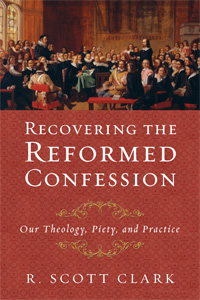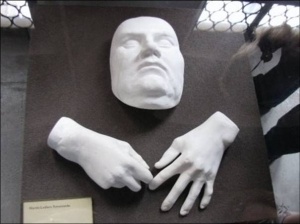The Regulative Principle of worship is a principle based on the sufficiency of Scripture which teaches that everything we do in the worship of God must have positive warrant in His Word. Every part of worship must be expressly commanded by God . . . Continue reading →
Recovering the Reformed Confession
The Addiction to Religious Euphoria
Mark Galli (HT: Alex Webster) has an interesting story in CT Online about the power of religious euphoria. He likens the attraction to, indeed the addiction to euphoria to attraction and addiction to a drug. Galli writes: We disdain faith that is . . . Continue reading →
Basement Tapes: The Covenant Radio Interview
Digging through an old hard drive, looking for another file, I stumbled across an interview I thought was lost, the Covenant Radio interview with William Hill on the Federal Vision and Recovering the Reformed Confession. Here’s the interview:
The Coherence Of Word And Spirit
A problem exists in the modern church, plagued by modernity, in her inability to see the coinherence of the word and Spirit. Pietism seeks a separation of the two, but Romanism prioritizes the office over the Spirit. If the institution and office . . . Continue reading →
When Subscription Isn’t
One of the chapters in RRC is about how we relate to our confession(s). Well, the whole book is about how we relate to our confession(s) but this chapter is devoted specifically to how we subscribe them. This is a big issue. . . . Continue reading →
Scripture Is Sufficient
Seeing that Christ Jesus is he whom God the Father hath commanded only to be heard and followed of his sheep, we judge it necessary, that his gospel be truly and openly preached in every church and assembly of this realm; and . . . Continue reading →
Three Benefits Of Confessions
Although not particularly popular, either in our present secular milieu or in bearing our present ecclesiological amnesia, I continue to believe that having, holding, and requiring a confession is good for us. In short, a confession is good for our health, even . . . Continue reading →
Todd Is Recovering The Reformed Confession
From the end of 2008 to 2013 I was the lead teaching pastor of a large non-denominational church in the northeast. During my time there I was told by various elders to lead the church in a more “broadly evangelical” direction. By . . . Continue reading →
Wisdom On Introducing Psalm Singing
1) Many people do not know you can sing the psalms (at least, other than Psalm 23, 62, and 100). “The psalter” is a foreign term, and even after people are introduced to singing psalms, they find it incredibly awkward to actually . . . Continue reading →
Available Now: Gillespie Against English Popish Ceremonies
“Gillespie’s famous book is a vitally important work in the history of the Scottish Reformation, but it is much more than simply that. It has abiding and profound value for all who are committed to knowing, applying, and following the Word of . . . Continue reading →
On Catechetical Preaching
The reason this is a wonderful practice is that this type of preaching demonstrates the unity of Scripture. In reality, different texts from various authors and generations testify to a unified body of truth. This manner of preaching ensures that we develop . . . Continue reading →
Happy Birthday To The Shorter Catechism!
Thanks to Wayne Sparkman for his consistently excellent daily posts. From his keyboard comes a reminder that today is an anniversary of the Westminster Shorter Catechism. On this day in 1647, the House of Commons ordered the printing of the Westminster Shorter . . . Continue reading →
Machen’s Enemies Then And Now And The Myth Of Influence
Almost thirty years ago, when I first started to become interested in Reformed Christianity I happened to mention it to the Rev Wally Easter, pastor for evangelism at Westminster Presbyterian Church, in my hometown. Wally was a sweet fellow and very graciously . . . Continue reading →
On Traveling From Münster To Geneva
In 1535 the Reformation was about 14 years old. The Protestants had gained some legal status within the Empire but its existence was by no means secure. Internally it was wracked with dissension over the moral and theological implications of the doctrine . . . Continue reading →
Is John Piper Reformed? Or Holding The Coalition Together (Updated)
This morning my friend Kevin DeYoung (listen to the Office Hours interview with Kevin here) makes some arguments in defense of a broader definition of the adjective Reformed. This question is at the heart of why the HB exists and and why I wrote . . . Continue reading →
Freedom of the Christian Man (2)
Part 1. Many of us have spent time in forms of Christianity that are very strong on rules and slavery and very weak on grace and freedom. By “rules and slavery” I refer to the imposition of man-made rules by which sanctity . . . Continue reading →
Freedom of the Christian Man (1)
There is a great lot of talk in the evangelical and Reformed world(s) about sola Scriptura but one has the growing sense that not only is the Reformation scripture principle not well understood (e.g., it is often misconstrued as an endorsement of . . . Continue reading →
Reformed And Pentecostal?
In view of the controversy over the recent Strange Fire conference up the road, it seemed like a good time to re-post this HB classic from 2008. § James K. A. Smith has an interesting post at Christianity Today, Teaching a Calvinist to Dance. . . . Continue reading →
Laura Smit On The Foolishness Of Romantic Dreams About The Mainline
Some of my friends in the CRC seem to think that this would be a good thing. They speak to me with wistful longing about the “freedom” of the PCUSA. This is a romantic vision that is unrelated to the truth. The . . . Continue reading →
Beza On The Sabbath
We say that it is a superstition to esteem one day more holy than another, or to think that to abstain from labor is something which, in itself, pleases God (Rom 14:15, 6; Col 2:16,17). But, following what the Lord has commanded, . . . Continue reading →









